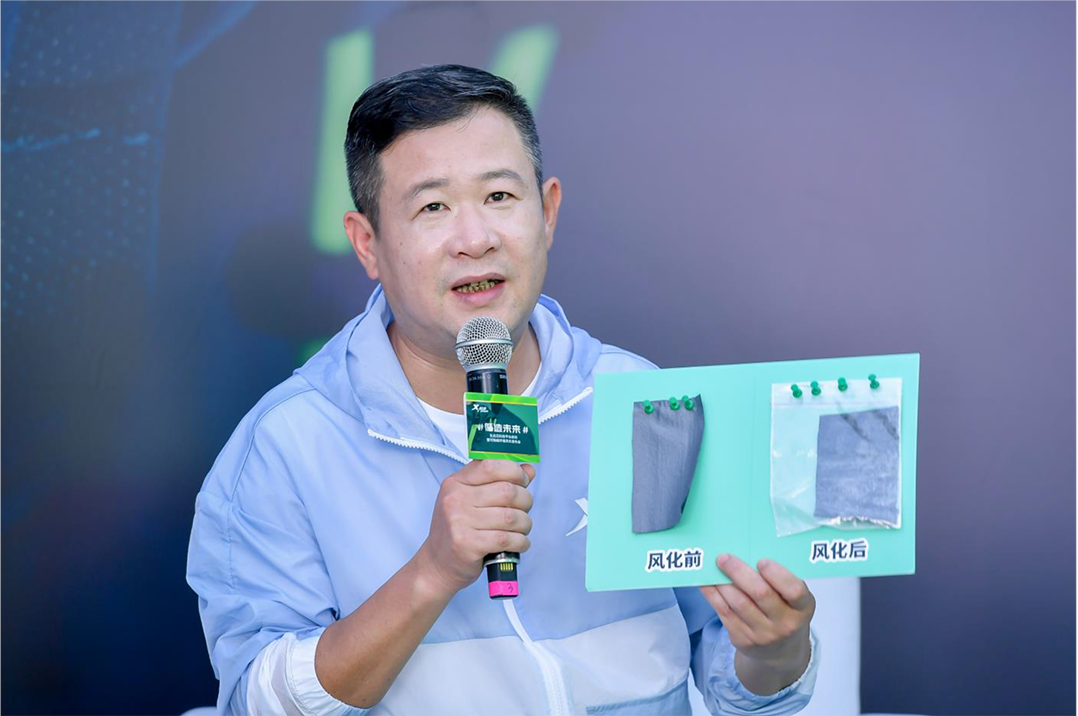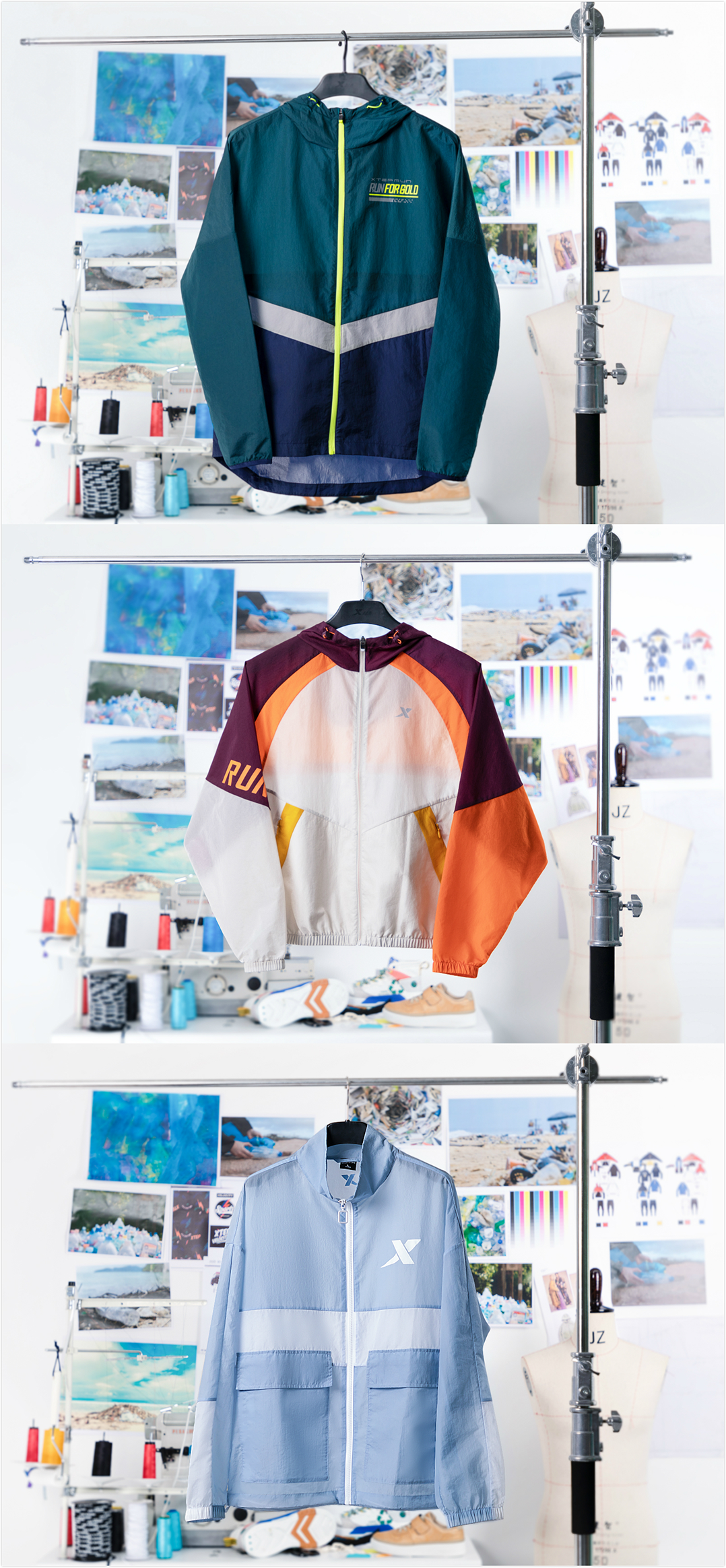Media
Corporate News
Back
5 June 2020, Hong Kong – Leading PRC-based professional sportswear enterprise Xtep International Holdings Limited (the “Company,” together with its subsidiaries, the “Group”) (Stock code: 1368.HK), announced the launch of its biodegradable Xtep-eco windbreakers during the live broadcasting of its “Recycle for the Future Ecological Chip Technology Platform Inauguration cum Degradable Xtep-eco Windbreakers Unveiling Conference” on 5 June, the World Environment Day. Mr. Ding Shui Po, Chairman and Chief Executive Officer of Xtep International Holdings Limited, Mrs. Zhu Meifang, Chinese Academy of Sciences (CAS) academician and Dean of the College of Materials Science and Engineering of Donghua University, Mr. Li Rongjie, Chairman of Anhui Fengyuan Group and celebrities including Nicholas Tse, Jeremy Lin and Jing Tian participated in the live broadcast to show their support. The Group also announced its environmental protection strategies through the debut of the ecological chip technology platform to demonstrate its determination to implement environmental protection initiatives to the society and ensure the sustainable development of the Company.

From products to platform - Xtep overcomes technical challenges to “Recycle for the Future”
At the unveiling conference, Xtep’s “cultivated garment” concept has attracted great attention from the apparel industry. Polylactic (PLA), a material used in the production of the Group’s biodegradable Xtep-eco windbreakers, is extracted from corn and straw and is completely biodegradable within one year under certain conditions. PLA is not resistant to high temperatures. Its dyeing temperature is lower than general polyester fiber by 0-10℃, and color-fastness issues are common in low temperature dyeing. This seemingly paradoxical proposition has plagued the domestic industry for many years, and there are only a few countries and companies around the world possess such technology. Xtep’s breakthrough has initially overcome the above technical issues and realized multi-color production for PLA garments. The first batch of degradable Xtep-eco windbreakers is available in 10 color combinations, adding youth and vitality to PLA apparel which has been mainly in a monochrome white.
Ms. Zhu Meifang, CAS academician and Dean of the College of Materials Science and Engineering of Donghua University, said, “The technological breakthrough in color-fast dyeing is important for the future popularization and promotion of PLA apparel. Looking ahead, we still need to solve other technical issues associated with improving PLA purity and weaving techniques.”
In addition to the 0-10℃ reduction in dyeing temperature relative to polyester fiber, PLA’s setting temperature is also 40-60℃ lower. Hence, PLA also provides benefits in energy-saving and consumption reduction. Commonly used overflow dyeing machines are able to process 1,000 yards of cloth per vat. Compared with woven polyester fiber, PLA uses 100 kilograms less steam per vat in dyeing cloth. Should Xtep change to use PLA for all apparel production, it will be able to save more than 3 million tons of steam a year and further lower production costs.
For the entire apparel industry, environmental protection is an important mission that still has a long way to go before its accomplishment. To advance to this end, Xtep has seized this initiative by introducing Xtep-eco windbreakers series made of biodegradable PLA woven fabric. Xtep-eco windbreakers represent an answer sheet and a question paper at the same time, because it not only reflects the Group’s long-term commitment to protecting the environment, but also provides a template for the industry on how to achieve this end in a sustainable way. Xtep believes that it not only has to boost the product sales, but also to promote the concept of environmental protection to the public through this product launch. As a responsible corporate citizen, Xtep built the Ecological Chip Technology Platform in order to further contribute to protection of the environment.
Mr. Ding Shui Po, Chairman and Chief Executive Officer of Xtep International Holdings Limited, said, “For footwear and clothing industries, greater environmental protection can be mainly achieved in three areas: green materials, green production and green products. Specifically, the first is about using green materials and recycling waste plastics, the second aims to save energy and reduce emissions through new technologies and techniques, and the third is to manufacture products that are both environmentally and people-friendly. In the short-term, the use of PLA is one of the major innovations of the Ecological Chip Technology Platform. Xtep will strive to make additional breakthroughs in its usage and expand it into a full product line within three years, and increase the proportion of PLA products within chemical fiber categories in phases. We plan to launch over one million PLA products quarterly in the market within three years.”

From R&D to production - environmental protection comes first in corporate development
In an ever-changing apparel industry characterized by constant innovations, environmental protection is a topic that never becomes obsolete. Environmental activists protested outside the venues of 2019 the Autumn/Winter London Fashion Week. According to some statistics, at least 80 billion clothes articles are manufactured every year worldwide, but most of the stocks are burned or disposed, so the sheer volume of factory output, waste of resources and resulting pollution can no longer be ignored. As such, the Group believes degradable material is the future of sustainable fashion, everyone can have a glimpse of the green vision of Xtep from its new biodegradable windbreakers. In fact, Xtep has already proactively explored environmental protection opportunities and strived to adopt this element in its products, production, brand promotion and corporate culture.
In recent years, Xtep has frequently incorporated new eco-friendly materials in product development to support environmental protection through action. Moreover, environmental protection in the production process has been regarded as an integral fundamental of sustainability by Xtep for more than two decades. Since 2010, Xtep has attained ISO14001 Environmental Management System Certification: Environmental and Occupational Health & Safety Management Systems and has implemented aspects of the system in all of its production sites in order to manage and minimize the environmental impact from its operations. In addition, photovoltaic system was installed and lighting systems were switched to LED modules for our production plant in Hunan to reduce the demand for energy consumption. Xtep has also invested in automated production lines to enhance the management of production-related information, so as to deliver a more reliable forecast for more effective resources planning.
From the brand to the public - leading a healthy sustainable lifestyle
Xtep has pursued green objectives in product quality and innovation as well as industry empowerment and development. Furthermore, through its running shoes and apparel, Xtep has actively conveyed the eco-friendly and healthy lifestyle of “Sports for All” to consumers.
The Group has vigorously presented its concept and positive value to the public through its brand. Xtep, as the sports brand sponsoring the most marathons in Greater China, has raised its profile at different major marathon events in recent years. During 2019 alone, those marathons attracted more than 800,000 runners. Thus, Xtep has exerted considerable effort in promoting a healthy lifestyle and the importance of healthy exercise to the public.
Mr. Ding added, “We want to go beyond driving sales volume to promote Xtep’s environmental protection concept to the public by capitalizing on new product launches. As a socially responsible enterprise, Xtep strives its utmost to contribute to environmental protection. For example, apparel is not just a product, but also represents a responsibility. Given the ongoing urbanization in Mainland China, the public are increasingly aspiring to a healthier lifestyle. After the outbreak of COVID-19, we expect that the public will place higher emphasis on and further strengthen their personal health. To tap this trend, we will continue to support consumers to pursue a healthy and green lifestyle by providing eco-friendly sports products. Environmental protection is not a burden of business development but rather a significant factor driving the supply-side structural reform of enterprises. Promoting environmental protection means advancing development quality, and sustainable development. Providing environmentally-friendly products to spread a healthy and green concept is a means to fulfill social responsibility and realize a sustainable future.”
About Xtep
Business Model
Our Brands
Investor Relations
Sustainability




